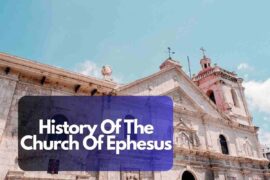Throughout history, certain places have gained an almost mythical status, their stories woven into the tapestry of human civilization. One such place is the ancient city of Ephesus, renowned for its cultural significance, architectural marvels, and, notably, its association with the early Christian church. Nestled on the western coast of Asia Minor, in what is now modern-day Turkey, the Church of Ephesus emerged as a bastion of faith and played a pivotal role in shaping the early Christian movement.
In this article, we embark on a captivating journey to uncover the facts and mysteries surrounding the Church of Ephesus. We will explore its historical context, delve into its significance within the early Christian movement, and unearth the remarkable remains that still stand as a testament to its once-thriving existence. From its majestic Temple of Artemis to the awe-inspiring Great Theater, we will unravel the architectural wonders that adorned this ancient city, while also examining the challenges and triumphs experienced by the early Christian community that called Ephesus home.
Contents
Facts About The Church Of Ephesus
The Church of Ephesus was an early Christian community located in the ancient city of Ephesus, which is now part of modern-day Turkey. Ephesus was a significant city during the Roman Empire and served as the capital of the Roman province of Asia. The church itself was founded in the first century AD and played a crucial role in the spread of Christianity in the region.
Importance and historical significance of the church
The Church of Ephesus holds great historical and biblical significance. It was one of the seven churches mentioned in the Book of Revelation, addressed by the Apostle John in his vision. In the New Testament, the city of Ephesus is mentioned multiple times, particularly in the writings of the Apostle Paul. It was one of the major centers of early Christianity, known for its influential role in the growth and development of the Christian faith.
Ephesus was home to the Apostle Paul for a significant period of time. He established the church during his missionary journeys and spent approximately three years there, teaching and preaching the gospel. The Epistle to the Ephesians, written by Paul, is one of the books in the New Testament and addresses the members of the Church of Ephesus, providing them with spiritual guidance and encouragement.
The church’s historical significance lies in its prominence as a hub of early Christian activity. It served as a strategic location for the spread of the gospel throughout Asia Minor. The teachings and influence of the Church of Ephesus had a ripple effect on neighboring cities and regions, contributing to the expansion of Christianity during the first century.
Furthermore, Ephesus was a center of trade, commerce, and culture in the ancient world. Its prominence as a city added to the visibility and impact of the Church of Ephesus, as it attracted a diverse population and provided a platform for the dissemination of Christian teachings to people from various backgrounds.
The Church of Ephesus played a crucial role in the development of Christian theology and doctrine. The theological teachings and writings associated with the church, along with its interactions with other early Christian communities, contributed to the formulation of key beliefs and practices within the early Christian movement.
Historical Background
Founding of the Church of Ephesus
The Church of Ephesus was founded by the Apostle Paul during his third missionary journey, around 52-53 AD. Paul arrived in Ephesus and initially preached in the local synagogue, but as opposition arose, he shifted his ministry to the school of Tyrannus. He spent a significant amount of time there, teaching and making disciples, which led to the establishment of a vibrant Christian community in the city.
Connection to the Apostle Paul
The Church of Ephesus had a strong connection to the Apostle Paul. Paul’s ministry in Ephesus lasted for about three years, during which he played a pivotal role in establishing and nurturing the church. He developed close relationships with the believers in Ephesus, teaching them the principles of the Christian faith and providing guidance through his letters. The Epistle to the Ephesians, written by Paul, is an important document addressing the members of the Church of Ephesus, emphasizing themes such as unity, salvation, and spiritual growth.
Mention of Ephesus in the New Testament
The city of Ephesus is mentioned in various books of the New Testament, indicating its significance in early Christian history. Apart from the Epistle to the Ephesians, the Book of Acts recounts Paul’s ministry in Ephesus, highlighting his encounters with both Jews and Gentiles in the city. In the Book of Revelation, written by the Apostle John, Ephesus is one of the seven churches addressed in the letters to the churches, where commendations and admonitions are given.
Relationship with other early Christian communities
The Church of Ephesus had connections and relationships with other early Christian communities. Ephesus served as a central hub of Christianity in the region, attracting believers and travelers from various cities. The exchange of teachings, ideas, and communication between Ephesus and other Christian communities contributed to the development and spread of Christian theology and practices. The relationships between the churches in Ephesus and neighboring cities are mentioned in Paul’s letters, demonstrating a network of mutual support and influence within the early Christian movement.
Location and Architecture
Description of the city of Ephesus
Ephesus was an ancient Greek city located on the western coast of Asia Minor, near the Aegean Sea. It was known for its strategic location, vibrant trade, and significant cultural and religious influences. The city boasted remarkable infrastructure, including paved streets, public buildings, and a magnificent theater. Ephesus was also famous for the Temple of Artemis, one of the Seven Wonders of the Ancient World.
Overview of the church’s physical structure
The physical structure of the Church of Ephesus is not known in detail, as no remains of an early Christian church building have been discovered. However, it is believed that the early Christian community in Ephesus likely gathered in private homes or rented spaces for worship and fellowship. These spaces would have been adapted to accommodate the needs of the growing church.
Notable features and architectural details
While specific architectural details of the Church of Ephesus are scarce, the influence of Roman and Greek architectural styles can be observed in the region. Ephesus was known for its grand architecture, including the Library of Celsus, the Great Theater, and the Temple of Artemis. The presence of these magnificent structures likely influenced the aesthetics and architectural sensibilities of the early Christian community in Ephesus.
Furthermore, it is important to note that the city of Ephesus was home to the Temple of Artemis, which held significant religious and cultural importance in the ancient world. The interaction between the Church of Ephesus and the worshipers of Artemis likely played a role in shaping the church’s approach to evangelism, apologetics, and the addressing of religious syncretism.
While the physical structures of the Church of Ephesus remain largely unknown, its influence and impact on the region can be seen through its theological teachings, relationships with other early Christian communities, and the historical legacy it has left behind.
Role and Influence of the Church
Importance of Ephesus as a Center for Early Christianity
The Church of Ephesus held significant importance as a center for early Christianity. As one of the major cities in the Roman Empire, Ephesus served as a hub for trade, commerce, and cultural exchange. This favorable location provided the church with opportunities to reach diverse populations and spread the teachings of Jesus Christ throughout the region. The influence of the Church of Ephesus extended beyond its immediate vicinity, impacting neighboring cities and regions, and contributing to the growth and development of the Christian faith.
Leadership and Notable figures within the church
The Church of Ephesus had prominent leaders and notable figures who played vital roles in its development. Among them, the Apostle Paul stands out as the primary figure associated with the founding and nurturing of the church. Paul’s teachings and personal influence shaped the beliefs and practices of the Ephesian Christians. Additionally, other individuals, such as Timothy and Apollos, were closely connected to the church and contributed to its leadership and spiritual growth.
Relationship with the wider Christian community
The Church of Ephesus had a significant relationship with the wider Christian community of the time. Ephesus served as a bridge between the Christian communities in the eastern and western parts of the Roman Empire. The exchange of ideas, teachings, and letters between Ephesus and other churches, as well as visits from leaders and messengers, fostered a sense of unity and cooperation among early Christian communities. The Epistle to the Ephesians, addressed to the Church of Ephesus, was likely intended to be circulated and shared with other churches, emphasizing the interconnectedness of early Christian communities.
Challenges and Conflicts
Opposition from other religious groups in Ephesus
The Church of Ephesus faced opposition from various religious groups, particularly those connected to the worship of Artemis, the city’s patron deity. The presence of a strong cult dedicated to Artemis posed a challenge to the spread of Christianity in Ephesus. The followers of Artemis and other polytheistic beliefs may have viewed the Christian community as a threat to their religious practices, leading to hostility and persecution.
Internal Conflicts and theological disputes
Like many early Christian communities, the Church of Ephesus experienced internal conflicts and theological disputes. These disagreements often revolved around interpretations of doctrine, practices, and leadership. The New Testament provides evidence of such disputes, such as the reference to the Nicolaitans in the Book of Revelation. Despite these challenges, the Church of Ephesus remained resilient and sought to address these conflicts through apostolic teachings and the guidance of their leaders.
The role of the church in addressing social and cultural issues
The Church of Ephesus played a vital role in addressing social and cultural issues of the time. Ephesus was known for its diverse population, and the church had to navigate and respond to the challenges posed by cultural practices, social structures, and societal issues. The teachings of the Apostle Paul and other early Christian leaders provided guidance on matters such as marriage, ethics, and social relationships. The church sought to promote Christian values and principles while engaging with the broader society and positively impacting the lives of its members and the wider community.
Despite the challenges and conflicts faced by the Church of Ephesus, its role in shaping early Christianity, its leadership, and its efforts to address social and cultural issues contributed to its significance and enduring legacy in Christian history.
Contributions to Christianity
Theological teachings and writings associated with the Church of Ephesus
The Church of Ephesus made significant contributions to Christian theology through its teachings and writings. The Epistle to the Ephesians, written by the Apostle Paul, is one of the key theological texts associated with the church. This epistle addresses themes such as the unity of believers, the mystery of Christ, salvation by grace through faith, and the spiritual armor of God. The teachings of Paul and other leaders within the Church of Ephesus provided a foundation for early Christian theology, emphasizing the centrality of Christ, the role of the Church, and the importance of believers’ spiritual growth.
Influence on early Christian doctrines and beliefs
The Church of Ephesus played a significant role in shaping early Christian doctrines and beliefs. The teachings and influence of the church contributed to the development of key doctrines, such as the divinity of Christ, salvation by grace, and the concept of the Church as the body of Christ. The theological emphasis on the indwelling of the Holy Spirit and the believers’ union with Christ had a lasting impact on Christian theology. The Church of Ephesus contributed to the formation of theological concepts that became foundational in Christian thought and continue to shape Christian beliefs today.
Development of the Ephesian School of thought
The Church of Ephesus also had an impact on the development of the Ephesian School of thought. This school of thought emerged from the teachings and writings of early Christian leaders associated with the Church of Ephesus. The Ephesian School emphasized mystical and contemplative elements of Christianity, focusing on the believer’s union with Christ and the transformative power of the Holy Spirit. The Ephesian School contributed to the broader currents of Christian spirituality, emphasizing the pursuit of spiritual growth, union with God, and a deeper understanding of the mysteries of faith.
Decline and Legacy
Factors leading to the decline of the Church of Ephesus
The decline of the Church of Ephesus can be attributed to various factors. One significant factor was the rise of other centers of Christianity in the region, which led to a diffusion of influence and a shift of prominence. The changing political and cultural landscape, along with the spread of alternative religious and philosophical movements, also affected the church’s growth and influence. Additionally, external pressures, such as Roman persecution and internal conflicts within the church, may have contributed to its decline.
Impact of the Decline on the City of Ephesus
The decline of the Church of Ephesus had a profound impact on the city itself. With the diminishing influence of Christianity, the prominence of the city of Ephesus also waned over time. The once-thriving Christian community dwindled, and the city faced various other challenges, including the decline of trade and changing geopolitical dynamics. Eventually, Ephesus became a ghost town, with its once-great structures falling into ruin.
Legacy and historical significance of the church
Despite its decline, the Church of Ephesus left behind a lasting legacy and historical significance. Its teachings, writings, and theological contributions continue to shape Christian thought and practice. The Epistle to the Ephesians remains a cherished part of the New Testament, offering spiritual insight and guidance for believers. The ruins of Ephesus, including the Temple of Artemis and other archaeological remains, attract visitors from around the world, providing a tangible connection to the early Christian presence in the city. The Church of Ephesus serves as a reminder of the vibrant early Christian communities and their enduring impact on the spread and development of Christianity.
Modern-day Ephesus
The current state of the archaeological site
The archaeological site of Ephesus stands as a testament to the city’s rich history and the presence of the Church of Ephesus. While only a fraction of the ancient city has been excavated, what remains is impressive. Visitors can explore the well-preserved ruins of the Library of Celsus, the Great Theater, the Terrace Houses, and the Temple of Artemis. The site offers a glimpse into the grandeur and sophistication of the ancient city.
Importance of Ephesus as a tourist attraction
Ephesus holds great importance as a tourist attraction, drawing visitors from around the world. Its historical and architectural significance, coupled with its association with the Church of Ephesus, makes it a captivating destination for history enthusiasts, archaeology lovers, and those interested in early Christianity. The site offers a unique opportunity to walk through the streets of an ancient city and experience the atmosphere of a bygone era.
The continued relevance of the Church of Ephesus in Christian history
The Church of Ephesus maintains its relevance in Christian history, despite its physical decline. Its teachings, writings, and contributions to early Christian theology continue to shape the beliefs and practices of Christians today. The Epistle to the Ephesians, in particular, serves as a source of inspiration and guidance for believers. The church’s legacy is preserved through its mention in the New Testament and its connection to the broader narrative of early Christianity.
Conclusion
The Church of Ephesus was an influential early Christian community located in the ancient city of Ephesus. Founded by the Apostle Paul, it played a pivotal role in the spread of Christianity in the region. The church’s teachings, writings, and theological contributions contributed to the development of early Christian doctrines and beliefs. Despite its decline, the Church of Ephesus left behind a lasting legacy and continues to hold historical and theological significance.
The Church of Ephesus stands as a symbol of the early Christian movement and its impact on the world. Its teachings and influence helped shape the theological landscape of Christianity, while its connection to the wider Christian community emphasized the unity and interconnectedness of believers. Today, the ruins of Ephesus serve as a reminder of the vibrant early Christian presence in the city and provide a tangible link to the rich history of the Church of Ephesus. Its significance in Christian history cannot be overstated, as it continues to inspire and inform believers around the globe.








